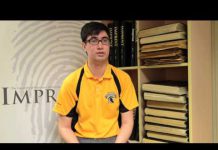The Occupy UW encampment held a press conference this morning, Friday June 28, at the Gaza House to address the recent lawsuit filed against them by the university. The lawsuit seeks an injunction to dismantle the encampment and demands $1.5 million in damages.
The lawsuit, detailed in court documents published on the university’s website, names several students and activists involved in the encampment, including Nicholas Joseph, Sarah Ahmed, and John-Lee Bannister. The legal action follows a formal notice issued by the university on June 21, demanding that the encampment, which has occupied the green space next to the graduate house since May 13, be dismantled immediately. The university’s statement claims the encampment poses safety hazards, constitutes trespass, and disrupts operations.
Press conference
During the press conference, key members of the encampment criticised the university’s actions, arguing that the lawsuit is an attempt to silence their protest. They highlighted broader concerns about freedom of expression and peaceful assembly on campus.
Nicholas Joseph expressed his dismay at the university’s decision to pursue legal action against students who are already financially vulnerable. He emphasized the encampment’s commitment to standing in solidarity with the people of Gaza, despite the university’s efforts to suppress their activism.
“I came here with pride and excitement, only to be nauseated by the realization that this institution is complicit in the murder of thousands of my people. $1.5 million — this is an absurd display of power, which communicates that anyone who exercises their freedom of expression to oppose the university will be met with crushed dreams and destroyed futures.”
Sarah Ahmed highlighted the financial and ethical dimensions of their protest. “The university knows we can barely afford tuition, let alone $1.5 million,” she said. “This is a clear attempt to intimidate us and silence our calls for divestment from companies involved in the oppression of Palestinians.”
She reiterated that they would not back down, also criticising the university’s increased surveillance measures, describing them as invasive and counterproductive. “There are cameras everywhere, monitoring our every move. Yet, despite this surveillance, the university has failed to protect us from harassment and threats. Instead, [they] focus on silencing our voices.”
John-Lee Bannister focused on the broader implications of the university’s actions for student activism and freedom of speech. He condemned the lawsuit as a scare tactic designed to suppress dissent and maintain control over the university’s narrative.
“This $1.5 million litigation is nothing more than a scare tactic to try and silence the students that have been speaking out. Claims of trespass and harassment, among others, are a smokescreen that the university is deploying to distract from its ongoing complicity in the butcher of Palestinians and outrageous criminalization of students protesting against the genocide,” Bannister stated.
He continued stating, “It’s disgusting and sends a chilling message to all students: your right to protest is subject to the administration, who is far from unbiased.”
Legal documents and public filings
The court documents filed by the university, which were made public, include detailed allegations against the encampment members. These documents also publicly named the students involved and included their email addresses, raising concerns about privacy and safety among the encampment members.
According to the lawsuit, the university is seeking $1.5 million in damages for trespass, property damage, and intimidation. The university has also requested an injunction to immediately dismantle the encampment and prevent any future occupation of university property. The legal action includes provisions for the Waterloo Regional Police Service to enforce the injunction if granted by the court.
Reactions and support
The press conference highlighted the encampment members’ resolve to continue their protest despite the legal challenges. They received support from various organizations and individuals, including Canadian Students for Justice in the Middle East, the National Council of Canadian Muslims, the Canadian Association of University Teachers, Faculty for Palestine, and Independent Jewish Voices.
The university’s lawsuit has also drawn criticism from faculty. Emmett Macfarlane, a UW professor and member of the task force on Free Expression and Inclusive Engagement, publicly denounced the university’s decision to pursue legal action. In his response, Macfarlane emphasized that the lawsuit contradicts the principles outlined in the task force’s report and warned that enforcing the injunction could increase the risk of violence against community members.
Moving forward
The press conference underscored the encampment members’ determination to continue their protest despite the legal challenges. They emphasized the importance of standing up for justice and human rights, and they vowed to remain resilient in the face of intimidation.
As the legal process unfolds, both the university and the encampment members are preparing for mediation talks set to begin next week. The university has expressed a willingness to continue productive and respectful dialogue with the encampment members, while the protesters remain steadfast in their demands for justice and accountability.































